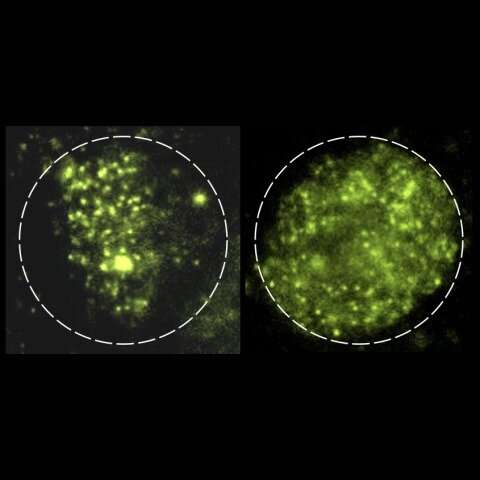
CCR researchers have discovered a new combination of drugs that significantly boosts the efficacy of anti-cancer treatments for colorectal cancers implanted in mice. The results, which also highlight a previously unknown mechanism of DNA repair, were reported June 23 in Nature Communications.
Topoisomerases 1 (TOP1) inhibitors are a common class of drugs used to treat colorectal cancer and several other types of cancer in people. As cells proliferate, the TOP1 enzyme helps resolve DNA structural issues but TOP1 inhibitors interfere with this process by trapping TOP1 on DNA. Therefore, this mechanism can be harnessed to kill cancer cells.
“TOP1 inhibitors are a common therapeutic regimen for colorectal cancer—but the thing is that cancer cells can develop resistance to these drugs,” explains Yilun Sun, a research fellow in the Developmental Therapeutics Branch.
This is because our cells, including cancer cells, have evolved multiple repair mechanisms to compensate for errors during DNA replication. This prompted Sun, under the leadership of Yves Pommier, M.D., Ph.D., Chief of the Developmental Therapeutics Branch, to search for drugs that could target these repair mechanisms. Such a drug could work well to enhance the anti-cancer effects of TOP1 inhibitors.
First, in collaboration with NIH’s National Center for Advancing Translational Sciences (NCATS), the researchers screened about 2,500 drug combinations. Their analyses suggested that a drug called pevonedistat may be particularly effective when used alongside TOP1 inhibitors. When mice with grafts of human colorectal tumors were treated with pevonedistat and the TOP1 inhibitor irinotecan, they showed significant tumor shrinkage and extended survival compared with mice treated with just one of the drugs. Similar results were seen in mice treated with pevonedistat in combination with a different TOP1 inhibitor, topotecan.
Sun, Pommier and their colleagues then did a series of follow-up experiments to understand the mechanism behind the action of pevonedistat—and they discovered a previously unknown mechanism of DNA repair. Their research shows how a protein called NEDD8 is required for the removal of trapped TOP1 enzymes. Pevonedistat works by blocking NEDD8, which explains why it is so effective at killing cancer cells in combination with TOP1 inhibitors.
Pommier emphasizes that this finding isn’t just important for chemotherapy research, but also for understanding the function of cells more broadly. “DNA damage happens accidentally all the time, and it has to be dealt with every day, by every cell. Yilun discovered this mechanism that enables the repair of unwanted DNA damage,” he explains. “It’s a basic discovery, but it’s potentially very important.”
In terms of treating colorectal cancer, there are several clues to suggest that pevonedistat will be a viable therapy. It is already FDA-approved to treat pre-cancerous myelodysplastic syndromes and its combination with TOP1 inhibitors was well tolerated in mice in this study, suggesting it could be safe in humans as well. The researchers also suspect that pevonedistat may be effective against other cancers treated with TOP1 inhibitors.
More information:
Yilun Sun et al, Targeting neddylation sensitizes colorectal cancer to topoisomerase I inhibitors by inactivating the DCAF13-CRL4 ubiquitin ligase complex, Nature Communications (2023). DOI: 10.1038/s41467-023-39374-9
Journal information:
Nature Communications
Source: Read Full Article